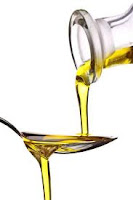Sex-Dependent Low GI Advantage(s) & Vasodilating Effects of Insulin. Diet-Dependant Effects of Active Vitamin D on Glucose Metabolism. Plus: Supplemental Flaxseed Oil?
The data does yet also raise the question, whether a higher activity level, a greater muscle mass or whatever something totally different is responsible for the non-significant effect the consumption of a high GI diet appears to have on the "strong sex". After all, even the devilish sugar sweetened soft-drinks which were associated with 4.45% higher body fat levels in girls who consumed one or more servings of the sugary glue per day, did not make a difference for the "young men" (suggested read: "Women Have a Much Higher Time Losing Body Fat Than Men")... ok, so let's see what else we've got "in the news today".
The vasodilatory effects of insulin could be life saving
(Hornstra. 2013) -- As a SuppVersity reader you are way beyond the stage of bro-science and thus fully aware that insulin not the villain everybody believes it was. Aside from the fact that it prevents catabolism, which is probably the only thing the average bro knows about, it helps nourish your cells, it keeps your blood from turning into a sweet slurry and has potent vasodilatory effects (ever wondered why you cannot get a decent pump ever since you went low carb?) |
| You don't still believe in the urban myth that adding fat to a high carb meal would blunt, the subsequent insulin spike, do you? Oh, you do? Well, in that case I recommend you take a look at one of the more recent installments of True or False (learn more)! |
What the researchers found was a clearcut inverse relationship between insulin-mediated vasodilation (r=-0.50; p<0.01) and the subjects' vascular resistance - a finding that was maintained after adjustment for age, sex, blood pressure and smoking and was not associated with local microvascular effects of acetylcholine.
Bottom line: The results of the study at hand do thus corroborate to the notion... or I should better write "the proven fact" that insulin is not solely the fattening villain the current mainstream Internet paradigm says it was. It is a powerful hormone with physiological importance well beyond it's role in glucose management and the increased risk of cardiovascular diseases in type II diabetics and the average non-insulin sensitive overweight Westerner is not due to having too much insulin floating around in the system, but due to the non-responsiveness of the cells of the ever-increasing number of pre-diabetics.
Low GI diets helps to shed >10% more during three months exercise intervention
(Solomon. 2003) -- In a way, you could say that the results of a soon-to-be-published study from the Department of Pathobiology at the Cleveleand Medical Clinic stands in line with both the SuppVersity Figure of the Week and the previous post on insulin's role in peripheral and systemic vascular resistance.In the study at hand, the ingestion of a low glycemic index diet, as it was prescribed to the 20 older, obese individuals who participated in a 3-months fully-supervised aerobic exercise program will did (a) improve the weight loss success of the subjects in the low GI (LoGIX) vs. high GI (HiGIX) groups by +10.5%, (b) improved their insulin sensitivity and should (this was not measured) thus have have had a beneficial impact on the vascular resistance of the overweight individuals and (c) promoted a lower respiratory exchange ratio (a low RER which is the ratio of glucose / fat oxidation is an indicator of in creased fatty acid and/or lowered glucose oxidation) during exercise and did thus help them to decrease the amounts of lipids floating around in their system.
 |
| Study probes whether "Hitting Your Macros" is all that counts (read more) |
All of you who did not see the discussion revolving around the necessity of high GI carbs and thus insulin spikes for glycogen repletion after a workout, I suggest you take a peak at the corresponding graph on I posted on Facebook earlier this week (go to the SuppVersity Facebook Wall). One thing you should keep in mind though, is the fact that "high GI diets" are not characterized by the occasional ingestion of "fast carbs" in the postworkout window - this alone is thus unlikely to cause the same ill health effects as a dietary protocol that does not even give your body the chance to clear the steady and rapid influx of glucose from the bloodstream (the "GL", i.e. the glycemic load may in fact be a better measure here, learn more)
Diet- and tissue-specific effects on transcriptional regulation of glucose metabolism
(Alharfy. 2013) -- In what is unfortunately yet another rodent study on vitamin D, researchers from the College of Pharmacy at the , King Saud University in Riyadh, Saudi Arabia, took a closer look at the differential effect vitamin D (1,25-(OH)2D3, Rocaltrol(R)) supplementation exerts on the transcriptional regulation of insulin-sensitive in liver, muscle and adipose tissue in Male C57BL/6J mice on regular low fat or obesogenic high fat (+high carb) chow. |
| Figure 1: Effect of vitamin D treatment on transcript levels of insulin sensitive genes in low-fat diet (LFD)- and high-fat diet (HFD)-fed mice (Alharfy. 2013) |
 |
| Maybe some of you remember that I covered a study in which vitamin D3 lead to increased obesity levels in rodents back in October 2011 (learn more) |
The decrease in hepatic GLUT-4 was yet still small compared to the rapid decline in GLUT-4 expression in the adipose tissue of the LFD group. Whether this could precipitate high blood glucose levels is yet about as uncertain as the implications of the highly elevated GLUT-4 expression in the HFD group. Theoretically the latter would help reduce blood glucose levels, but at an expense of profound increases in adipose tissue - that this is not very unlikely, is something you have read about here at the SuppVersity in October 2011, already (go back)
So what do the scientists say?
 |
| In view of the necessity to convert supplemental vitamin D3 to it's active form, it is questionable, whether the provision of the former would induce any of the changes Alharfy observed in the study at hand - learn more in a previous installment of the short news! |
"[...] antidiabetic effect of vitamin D may be directed through its anti-inflammatory action in obese conditions. Reduction in inflammatory cytokines production by vitamin D may play a role in decreasing insulin resistance." (Alharfy. 2013)The scientists' conclusion does therefore stand in line with the observations of Waldron et al. about which you've probably read on the SuppVersity Facebook Wall about a month ago (Waldron. 2013).
Based on the 25OHD response (remember: 25OHD is the precursor to calcitriol and will thus be lowered, when more calcitriol is produced from this 'storage form') the researchers from the New Cross Hospital, in Wolverhampton in the UK observed in response to inflammatory assaults, they were among the first to propose that "serum 25-(OH)D is a negative acute phase reactant [... and h]ypovitaminosis D may be the consequence rather than cause of chronic inflammatory diseases" (Waldron. 2013)
Bottom line: While we are still far away from a proper understanding of the exact mechanisms which underly the observed correlations between low vitamin D levels and all sorts of (eventually) inflammatory diseases, the results of the study at hand corroborate the notion that D3 levels (=passive storage) have little to no direct effects on the etiology of the diabetes, cancer, and what not.
 |
| Figure 2: Reductions (!) in all risk mortality calculated on the basis of NHANES data for each 10ng/ml increase in vitamin D up to the "magic" 21ng/ml margin from the Amer study (Amer. 2013) |
In the end, studies such as the one at hand, would have to be conducted over long enough periods in human beings to finally identify the mechanism behind the non-linear effects of vitamin D on mortality and metabolic health in the these and other studies. Personally, I would hope that studies like the one by Amer et al. get some more mainstream attention and raise people's awareness of the simple paradigm "test first, supplement second".
Flaxseed oil does not offer metabolic advantages over olive oil
 |
| If you don't like the feminine look and the size of certain body parts of this Greek statuette, you just found another reason to avoid flaxseed - at least if you are and want to stay male (learn more) |
According to a recent study from the Harokopio University in Greece this is yet nothing but another urban myth. In their randomized cross-over study (2x6 weeks + 6 weeks washout in-between), the scientists found that it did not make a physiologically significant difference whether the 37 normal weight young subjects (age: 22 years) consumed 15 mL/day of either flaxseed oil or extra virgin olive oil.
When it comes to the differences the scientists observed in response to the olive oil vs. flaxseed oil supplemented diet, you better have a magnifying glass ready, as the only highly visible change was allegedly not significant:
 |
| Oleuropein in olive oil is a natural testosterone booster (learn more) |
Now, you can certainly argue that the changes and potential benefits would have been more evident if the amount of flaxseed oil in the diet had been higher. On the other hand, you all should be aware that flaxseed oil goes rancid in no time, cannot be heated and tastes like a$$... this limits it's use as a regular part of your diet. What's more, if you take close look at the levels of hs-CRP in figure 3, you will have to admit that more flaxseed oil could also equal an increase in inflammation.
That's it for today: Why? Well, I simply had no time to write more earlier today and other than briefly posting this no additional time to spend writing up additional short-news... but judged by the visitor counts on the last weekends, you are probably busy enjoying the weekend, as well. Enjoy your weekend, everyone!
References:
- Amer M, Qayyum R. Relationship between 25-Hydroxyvitamin D and All-cause and Cardiovascular Disease Mortality. Am J Med. 2013 Apr 17.
- Brown LJ, Midgley AW, Vince RV, Madden LA, McNaughton LR. High versus low glycemic index 3-h recovery diets following glycogen-depleting exercise has no effect on subsequent 5-km cycling time trial performance. J Sci Med Sport. 2012 Nov 12.
- Gopinath B, Flood VM, Rochtchina E, Baur LA, Louie JC, Smith W, Mitchell P. Carbohydrate nutrition and development of adiposity during adolescence. Obesity (Silver Spring). 2013 Mar 21.
- Hornstra JM, Serné EH, Eringa EC, Wijnker MC, de Boer MP, Yudkin JS, Smulders YM. Insulin's microvascular vasodilatory effects are inversely related to peripheral vascular resistance in overweight, but insulin-sensitive subjects. Obesity (Silver Spring). 2013 Mar 20.
- Kontogianni MD, Vlassopoulos A, Gatzieva A, Farmaki AE, Katsiougiannis S, Panagiotakos DB, Kalogeropoulos N, Skopouli FN. Flaxseed oil does not affect inflammatory markers and lipid profile compared to olive oil, in young, healthy, normal weight adults. Metabolism. 2013 May;62(5):686-93.
- Melamed ML, Michos ED, Post W, Astor B. 25-hydroxyvitamin D levels and the risk of mortality in the general population. Arch Intern Med. 2008;168(15):1629-1637.
- Michaëlsson K, Baron JA, Snellman G, et al. Plasma vitamin D and mortality in older men: a community-based prospective cohort study. Am J Clin Nutr. 2010;92(4):841-848.
- Solomon TP, Haus JM, Cook MA, Flask CA, Kirwan JP. A low glycemic diet lifestyle intervention improves fat utilization during exercise in older obese humans. Obesity (Silver Spring). 2013 Mar 20.
- Waldron JL, Ashby HL, Cornes MP, Bechervaise J, Razavi C, Thomas OL, Chugh S, Deshpande S, Ford C, Gama R. Vitamin D: a negative acute phase reactant. J Clin Pathol. 2013 Mar 1.




